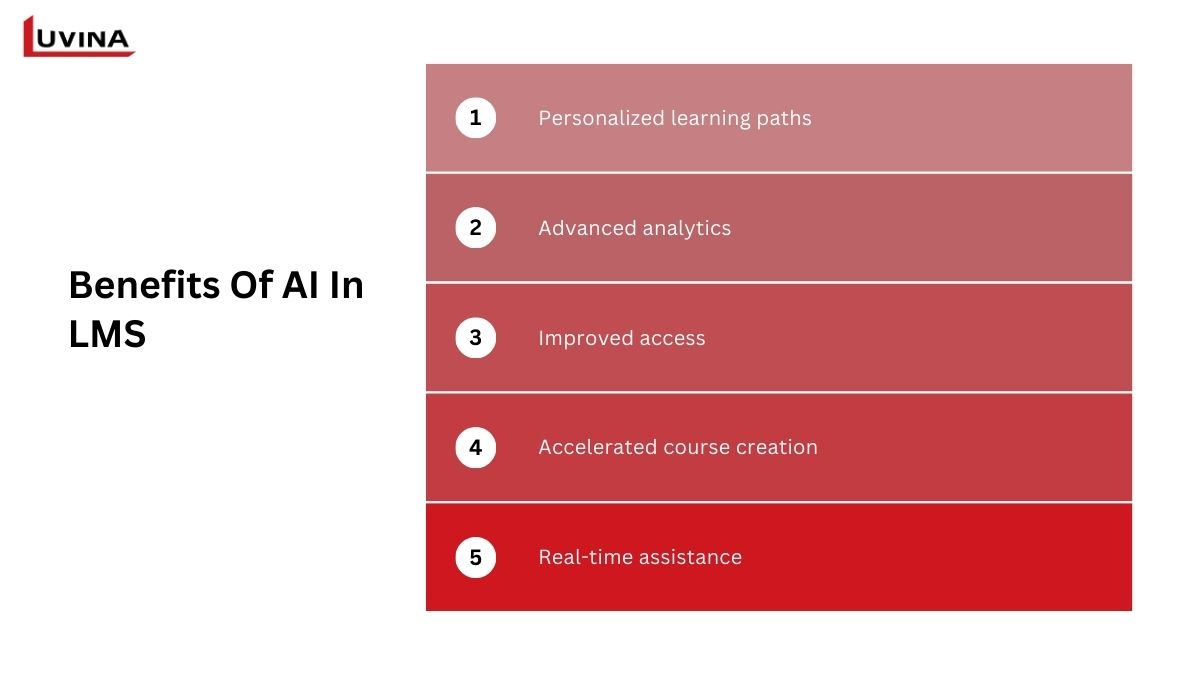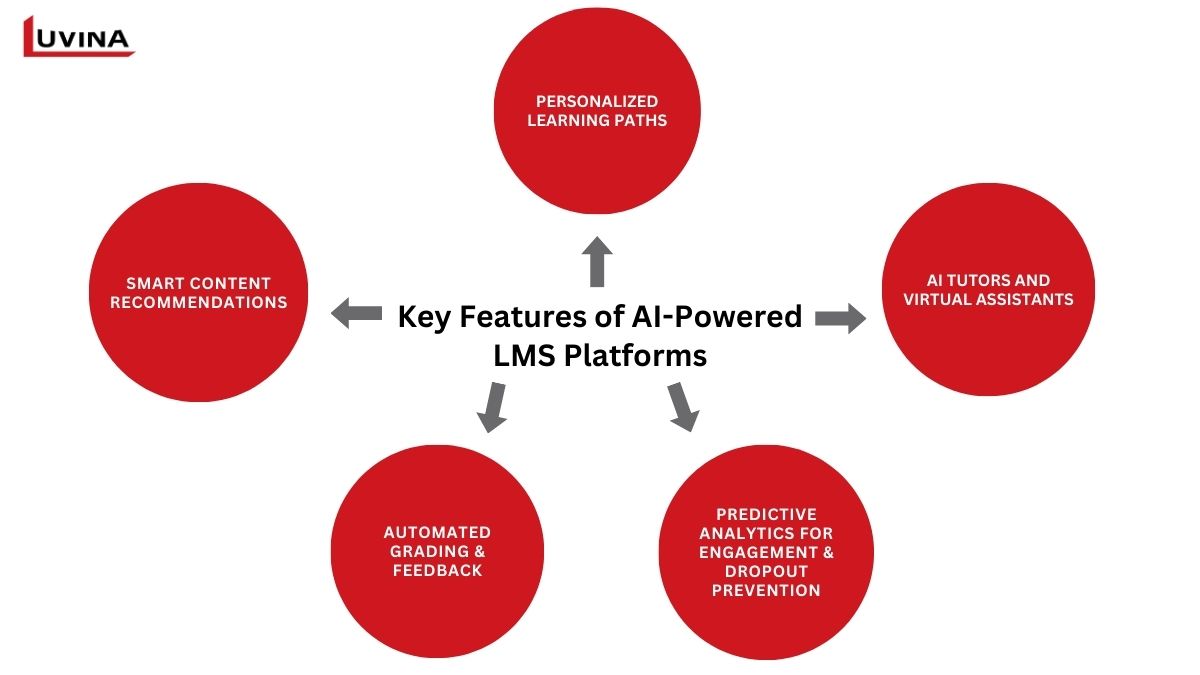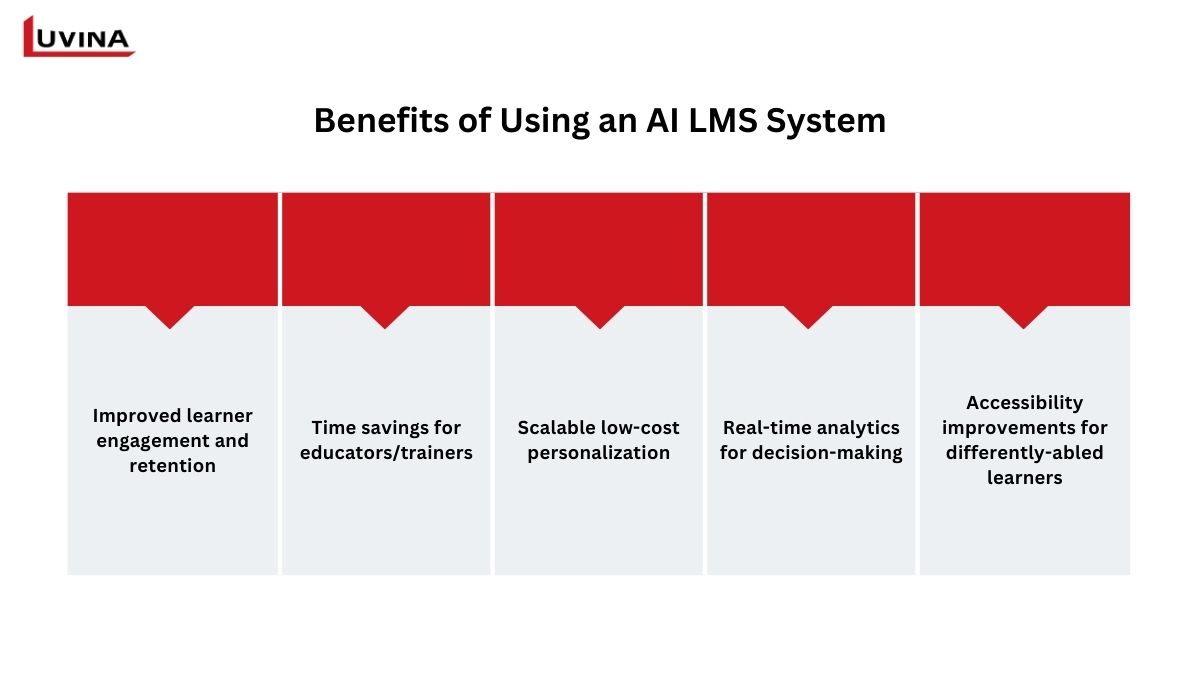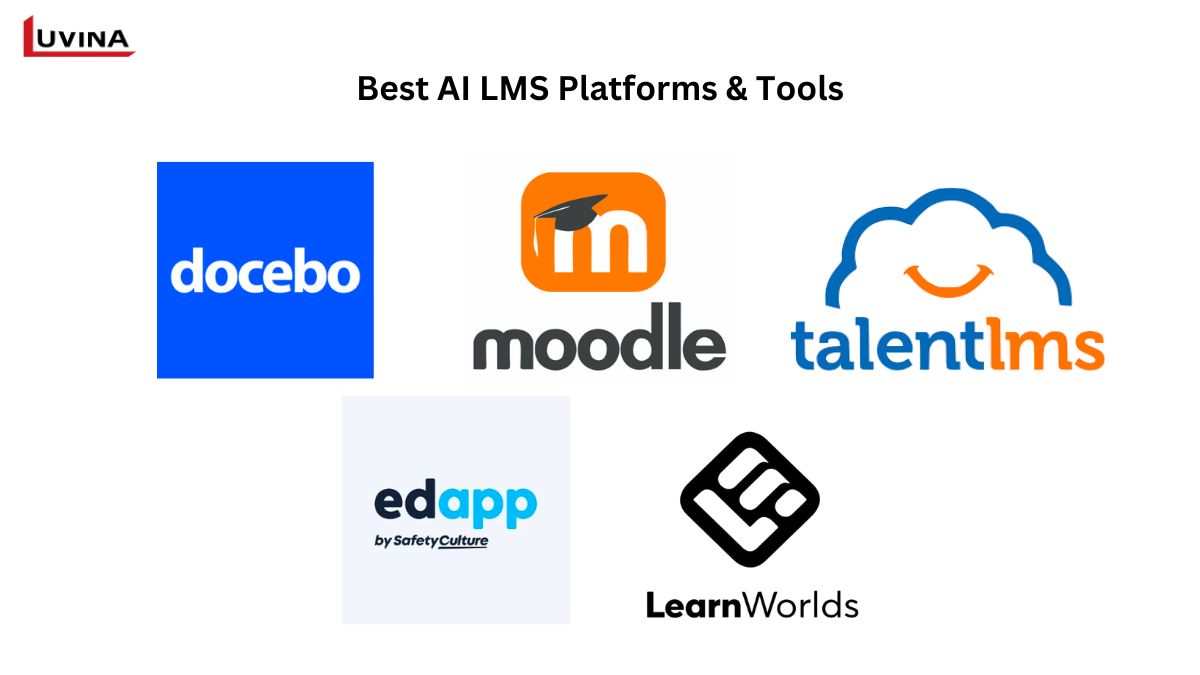The rapid development of artificial intelligence (AI) has transformed several industries, and education is no exception. One of the most significant influences is seen in learning management systems (LMS), where AI in LMS is transforming the way organizations manage training and development. From streamlining administrative tasks to examining student statistics, AI is changing the way training is delivered, and it is more efficient and effective.
In this guide, we will explore how AI is enhancing the learning process and how businesses can leverage AI in LMS to optimize their educational programs for better outcomes. Let’s dive in!
Benefits of AI in LMS
The integration of AI in LMS has changed learning platforms so that they are more intelligent and can customize their responses to particular requirements. Beyond conventional content distribution, AI-powered systems provide individual learning encounters that change in real-time. Analyzing learner actions, forecasting demands, and offering personalized material leads to more interaction and retention through better engagement.
From personalized learning paths to advanced analytics, AI enhances both the learner’s experience and the effectiveness of training programs. Here are some key benefits of incorporating AI into learning management systems:

- – Personalized learning paths: AI enables the customization of learning experiences, adjusting the content based on a learner’s pace and performance.
- – Advanced analytics: AI systems are capable of processing large volumes of data in a short time, providing rich insights into learner performance to detect trends, strengths, and areas of improvement, enabling organizations to optimize their training programs for improved results.
- – Improved access: AI improves access by, for instance, automatically translating content into other languages or adding captions to videos.
- – Accelerated course creation: AI accelerates the process of course creation by automating translations and content grouping.
- – Real-time assistance: AI-powered chatbots provide immediate, 24/7 support for learners, answering questions and guiding them through the material.
What is an AI LMS?
An AI LMS, or Artificial Intelligence Learning Management System, is a system of learning employing artificial intelligence technology to enhance and mechanize several areas of learning.
In contrast to the older learning management systems that primarily serve to place and display content courses, an AI in the LMS platform works on sophisticated algorithms that generate custom-made, adaptive learning experiences. This allows room for more dynamic delivery of content, efficient tracking of progress, and customized learning pathways based on a student’s interests and requirements.
One of the main differences between an LMS and an AI-based LMS is the level of automation and personalization. Traditional systems are mainly concerned with managing content and tracking completion rates, while AI LMS platforms do it one step further by utilizing technologies for tasks such as automated grading and proctoring. These technologies enable the system to review student information, predict future learning needs, and provide recommendations or adaptive learning pathways tailored to individual users.
Collaborative AI technologies used in AI LMS platforms are
- – Natural Language Processing (NLP): Enriches the system’s ability to understand and respond to learners’ questions and makes features such as chatbots and automated feedback feasible.
- – Machine Learning (ML): Continuously analyzes learner data to personalize content and optimize the learning experience.
- – Recommendation engines: Suggest courses and learning materials to learners depending on their previous activities and interests.
- – Computer Vision: Used for advanced proctoring solutions to ensure the integrity of tests through monitoring the environment of students.
Core Features of AI-Powered LMS Platforms
When considering an AI-based LMS, there are key features to look for that will help you get the most out of your platform. Here are the core features that define a top-tier AI in LMS platform:

a. Personalized Learning Paths
The most striking feature of an AI LMS is its ability to create personalized learning paths that adapt to the specifications of every learner. Unlike traditional systems that offer all users the same content, AI utilizes adaptive content delivery to personalize training to the knowledge level of a learner, preferences, and areas of improvement. This ensures that each user receives delivered materials at the right level of difficulty and speed, making learning more effective as well as engaging.
To achieve this, the website utilizes skill-based assessments and continuous behavior tracking. Such technologies help monitor gaps in knowledge as well as how the learner interacts with content over time. Based on this, the system dynamically adjusts learning pathways in real-time, providing relevant resources and feedback that maintain learners’ motivation while supporting their growth at all times.
b. Smart Content Recommendations
An AI LMS must offer smart content recommendations that are aligned with each learner’s unique journey. By analyzing learning history, performance indicators, and individual preferences, the system can offer specific modules or resources that complete knowledge gaps or build on current strengths. For example, if a learner has struggled with a particular topic or skill, such as time management, the system will automatically recommend focused training material to enhance it.
In addition to making personalized recommendations, AI also enables real-time content curation from substantial internal or external knowledge bases. Using technologies like natural language processing, the platform can scan information from documents, videos, and other content to locate and bring forward the most appropriate content for each user. This ensures that students have access to current, helpful information that supports their development goals without having to search manually.
c. AI Tutors and Virtual Assistants
AI tutors and virtual assistants are revolutionizing the way students engage with digital platforms by providing on-demand, one-on-one support. Based on natural language chatbots, they provide immediate responses to questions, simplify difficult concepts, and mentor users throughout their learning process. Available 24/7 and across several devices, they enable learners to remain engaged without waiting for human support.
From navigating learners through a course to offering immediate feedback on quizzes, these intelligent assistants make the experience more seamless and responsive for both users and administrators.
d. Automated Grading & Feedback
Automated grading & feedback are a core feature of an AI LMS system. AI applications will grade different kinds of tests—quizzes to short-answer questions—virtually in real-time, enabling learners to get instant feedback without waiting for instructor review. Beyond saving time, AI LMS also enhances the learning experience by offering personalized suggestions for improvement.
e. Predictive Analytics for Engagement & Dropout Prevention
AI-powered LMS must have the ability to predict learner engagement and flag potential dropouts before they happen. By continuously analyzing learner behavior, such as course time spent, participation level, and exam scores, AI can spot disengagement risk or warning behavior. Such warnings allow teachers and administrators to step in early enough to provide the support necessary for learners to regain on-time progress.
To make this actionable, AI-powered platforms typically have simple-to-use dashboards for teachers and admins. These dashboards show real-time metrics, trends, and alerts, allowing learning and development teams to make data-driven decisions, personalize learning strategies, and improve overall program effectiveness.
Benefits of Using an AI LMS System
Adopting an AI-powered learning management system can significantly enhance how organizations deliver and manage training. Here are some of the most impactful benefits:

- – Improved learner engagement and retention: Through the presentation of tasks that correlate with their present ability level, AI-driven content recommendation, and adaptive learning routes help learners stay engaged and retain their skills.
- – Time savings for educators/trainers: For teachers/coaches, time savings come from automated grading, feedback, and course customization as well as from more coaching and strategy than from hands-on labor.
- – Scalable low-cost personalization: Due to the use of AI in LMS, it is now easy to provide highly personalized learning experiences to users without increasing development effort by many folds. Artificial intelligence curates just-in-time resources that optimize performance by analyzing data on user taste, action, and skill gaps without bringing operational costs in-house.
- – Real-time analytics for decision-making: Artificial intelligence analytics give immediate insight into student performance, content efficacy, and interaction levels…; help trainers, teams, and managers to employ quick, data-driven decision-making to continually improve learning strategies and outcomes.
- – Accessibility improvements for differently-abled learners: AI LMS tools have command, screen reader, real-time transcription, and an adaptive interface, making differently-abled students able to contribute and excel within the platform as well.
Best AI LMS Platforms & Tools [latest updated]
AI in LMS not only enhances personalization and automates routine tasks but also empowers learning and development teams with real-time insights and streamlined content creation. Below, we’ve highlighted some of the most innovative AI LMS platforms of 2025 that are leading the way in reshaping the learning and training process:

1. Docebo Learn LMS
Docebo Learn LMS is a robust, cloud-based system that is designed to simplify corporate training while giving users an extremely personalized learning experience. Through the use of integrated AI functions, the system automates time-consuming processes and simplifies content discovery through intelligent features.
Docebo’s other key feature includes its auto-tagging and skill-tagging, under which the AI machines automatically recognize key phrases in the learning material and generate relevant tags accordingly. Besides improving course structuring, it also makes the filtering of content better.
Additionally, Docebo’s AI-powered Deep Search and personalized content recommendations—like the Invite-To-Watch feature—ensure that learners receive targeted suggestions based on skill relevance and learning behavior, ultimately boosting engagement and learning efficiency.
2. Moodle with AI Plugins
Moodle is an extremely flexible open-source learning management system that is famous for its flexibility and global usage in academic and business environments. What stands out in Moodle is that it can be integrated with numerous AI-based plugins easily, so that learners can enhance their learning platforms with intelligent analytics and adaptive learning functionalities.
With AI in LMS capabilities integrated via plugins, Moodle can offer data-driven insights, automate feedback, and facilitate adaptive learning experiences. With its mature plugin ecosystem, solid community support, and 24/7 support from certified providers, it’s a serious contender for organizations seeking an affordable but scalable AI-powered LMS solution.
3. TalentLMS + AI Extensions
TalentLMS, a straightforward learning management system utilized by over 70,000 teams, provides an effortless solution for organizations of all sizes. With the addition of AI LMS extensions, TalentLMS enhances its capabilities even further, with intelligent content recommendations, adaptive learning paths, and real-time analytics to optimize learner engagement. Organizations can also speed up and make course creation more efficient through the use of AI features.
4. LearnWorlds
LearnWorlds is an AI-powered learning management system designed to help individuals and organizations create, sell, and promote online courses. Beyond learning management, LearnWorlds offers a built-in marketing engine to support affiliate marketing, course bundles, subscription models, and seamless payment processing.
Its AI-powered features consist of interactive video features and quiz builders, allowing for compelling tests and more interactive learning. With a large support library of resources, LearnWorlds ensures learners can easily navigate the platform and maximize its capabilities.
5. EdApp by SafetyCulture
EdApp is a mobile-first AI LMS platform designed to enhance employee learning through microlearning, allowing access to training anytime, anywhere, and on any device. What stands out is the AI Create tool, which makes the task of course creation much easier: complete lessons at the click of a button. This has dramatically reduced the time of the design period by having the user spend more on interactive elements for their content rather than research time.
Through its friendly interface and artificial intelligence-enabled functions, EdApp offers a comprehensive solution to organizations that have to develop impactful training programs in no time.
| Platform | Pricing | Key AI Features | Use cases |
| Docebo Learn LMS | Custom quote | Auto-taggingContent recommendations | Corporate |
| Moodle with AI Plugins | Self-hosted: Free Paid hosting: from $100/year | Ai analytics | Higher education and corporate |
| TalentLMS + AI Extensions | Core – $89-$199/monthGrow – $139-$369/monthPro – $179-$696/monthEnterprise – Custom quote | AI-assisted content generationAI-based assessments | Corporate |
| LearnWorlds | Starter – $24/month (with $5 per course sale)Pro Trainer – $79/monthLearning Center – $194.35/monthLearning Center + Mobile App – $364.78/month | AI-powered video and quizzes | Higher education and corporate |
| EdApp by SafetyCulture | Free: $0/seat/monthPremium: $24/seat/monthEnterprise: Custom price | MicrolearningAI insights | Corporate and K-12 |
Real-World Use Cases of AI in LMS
Here are some real-world examples of how AI is being implemented in learning management systems across different contexts:
1. Corporate training
AI-powered LMS platforms have transformed corporate training, especially in areas like employee onboarding and compliance. The platforms utilize AI when developing personalized learning pathways, therefore making the process of learning meaningful and relevant for the learner. With adaptive learning, automated curation of content, and virtual coaching, firms can be assured that employees are not only acquiring things but are being reskilled and upskilled, job-mapped, to put it precisely.
AI use also helps in tracking progress, providing data-driven feedback to managers to keep workers on pace with training.
2. Higher education
At the university and college levels, AI in LMS platforms is helping to tailor the delivery of the curriculum and enhance student retention and overall learning achievements. Through examination of student performance, AI helps to suggest the most suitable learning materials, exams, and paths of learning to ensure that individual students get personalized education.
Moreover, AI-powered systems can recognize vulnerable students early enough for teachers to step in and offer the support needed to enable them to succeed.
3. K-12 remote learning
In K-12 education, AI-powered LMS platforms are enhancing remote learning through adaptive, gamified modules. By integrating gamification elements, such as rewards, levels, and leaderboards, these platforms make learning more fun and engaging, which is especially important for younger students.
4. Government or NGO Upskilling Programs
AI LMS are also gaining significance in government and NGO upskilling programs, particularly in developing markets or regions of high unemployment. The systems enable organizations to deliver scalable, customized training solutions to massive populations and arm them with skills demanded in today’s job markets.
Frequently Asked Questions
Is AI LMS only for large organizations?
No, AI LMS can benefit organizations of all sizes, including small and medium businesses.
Can I integrate AI into an existing LMS?
Yes, many AI features can be integrated into existing LMS platforms to enhance their capabilities.
How is AI different from automation in LMS?
AI focuses on personalized learning, adapting content and experiences based on individual needs, while automation handles repetitive tasks like scheduling or reporting.
Do AI LMS tools require technical expertise?
Not necessarily. Many AI LMS platforms are designed to be user-friendly, with minimal technical expertise required for setup and use.
Conclusion
As we have discussed, learning providers are now tapping into the power of artificial intelligence to aid learning and development (L&D) programs. The integration of AI in LMS platforms is a milestone in the e-learning industry. However, one has to be aware of the ethical concerns and pitfalls of AI technology since these will guide the utilization of such systems going forward.
At Luvina, we are excited about the transformative potential AI has to offer to learning. We help organizations develop AI-based LMS solutions or integrate AI into existing systems.
Let us help you design an AI-based LMS that perfectly fits your learning environment. Contact us today and let us together shape the future of learning.









Read More From Us?
Sign up for our newsletter
Read More From Us?
Sign up for our newsletter